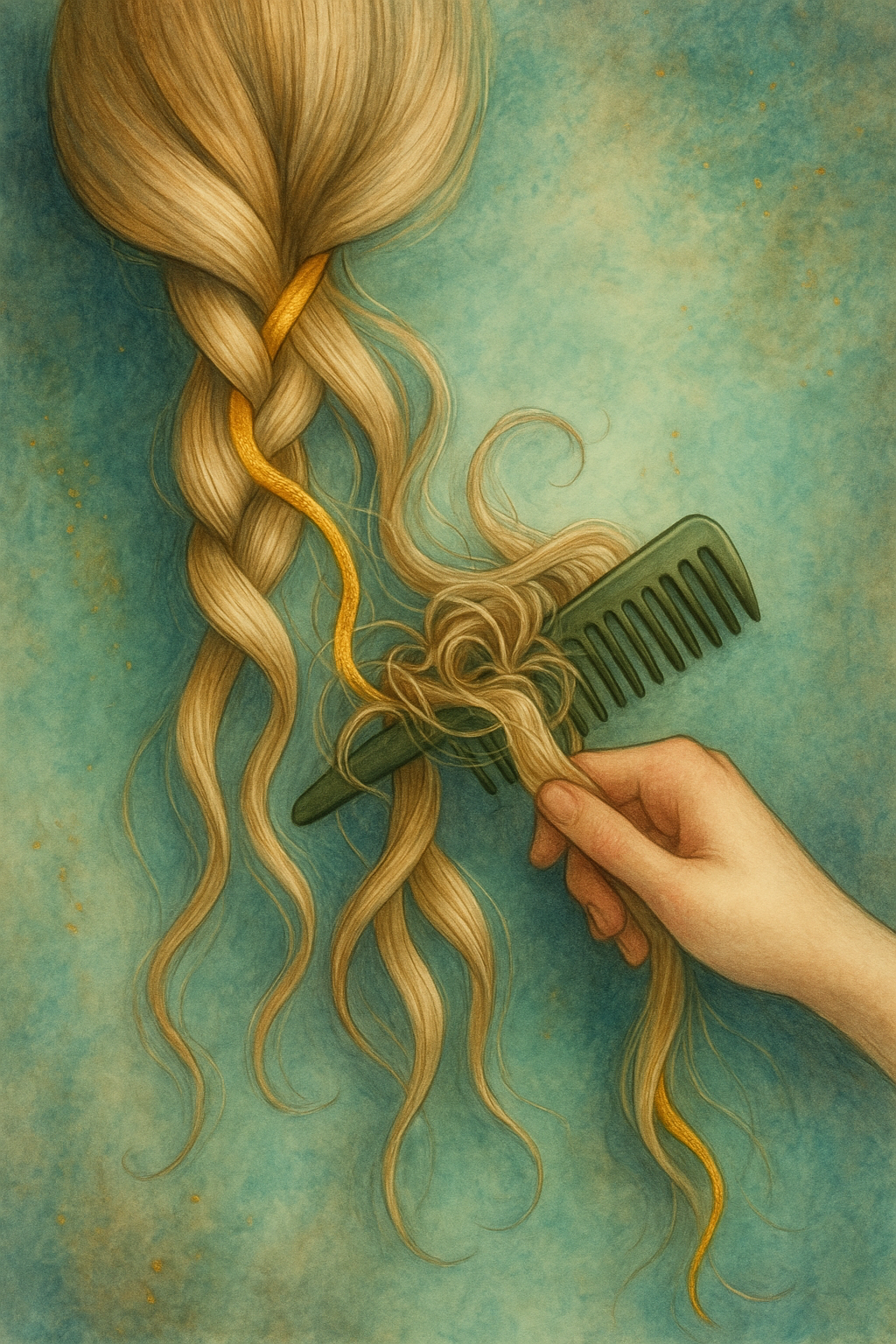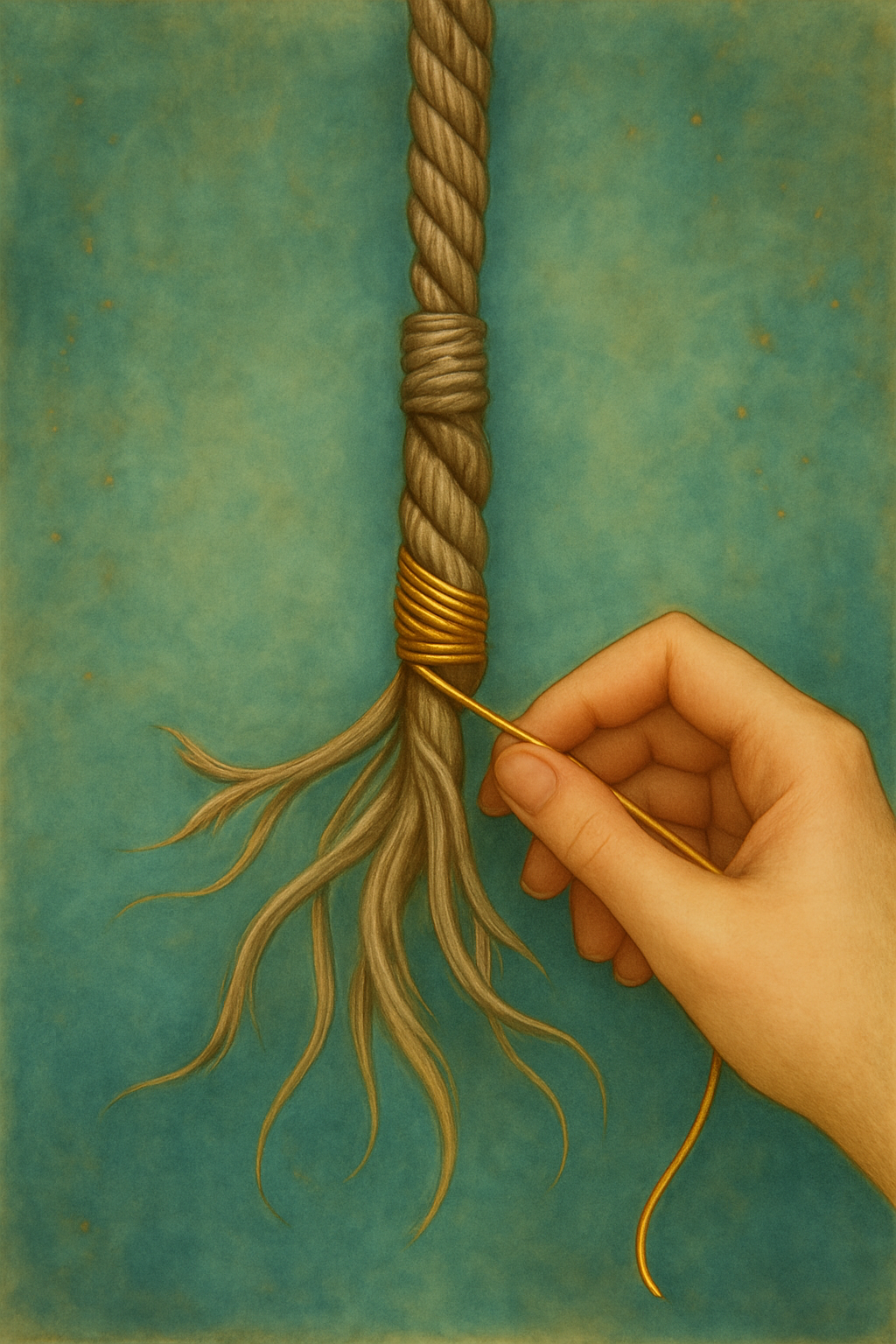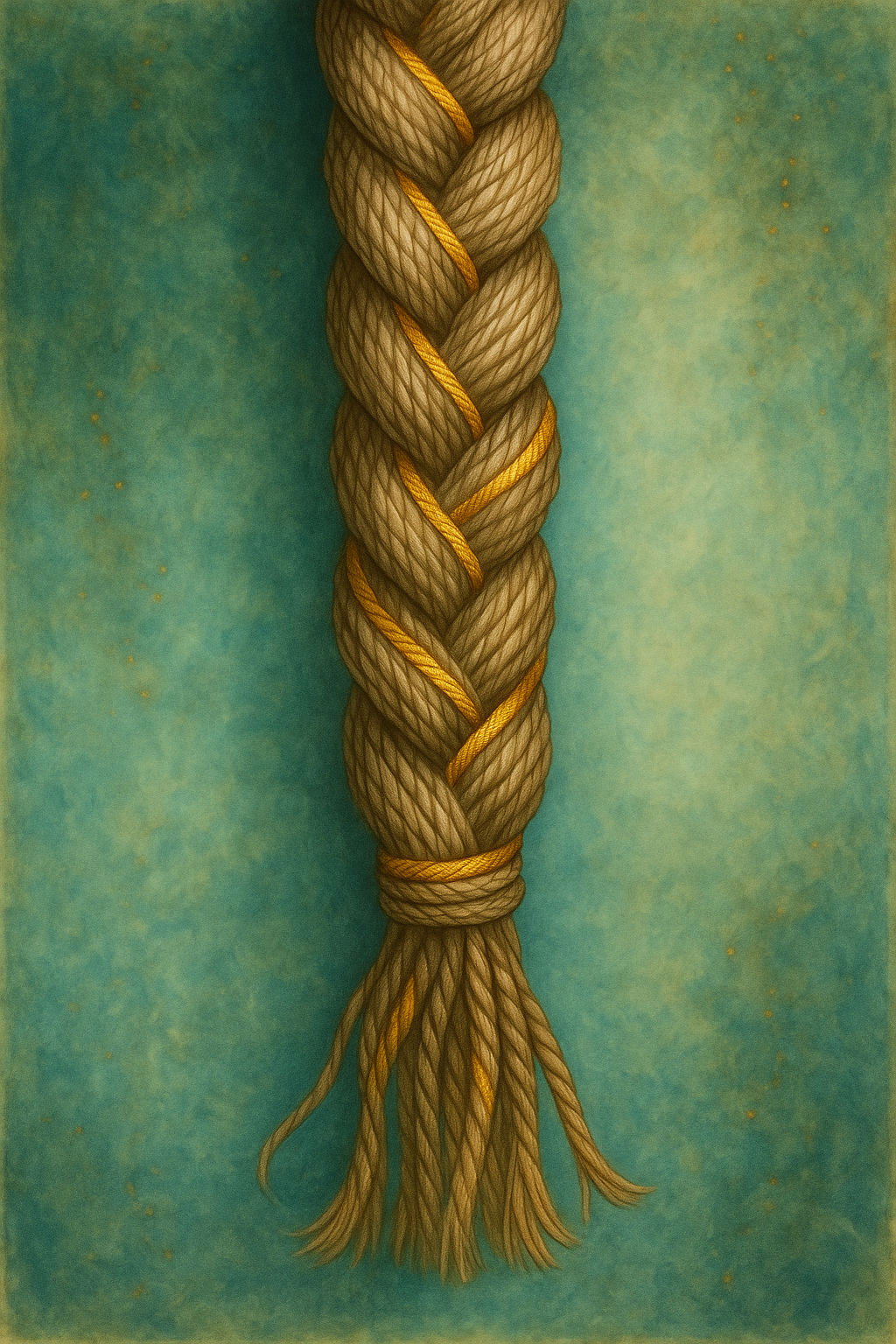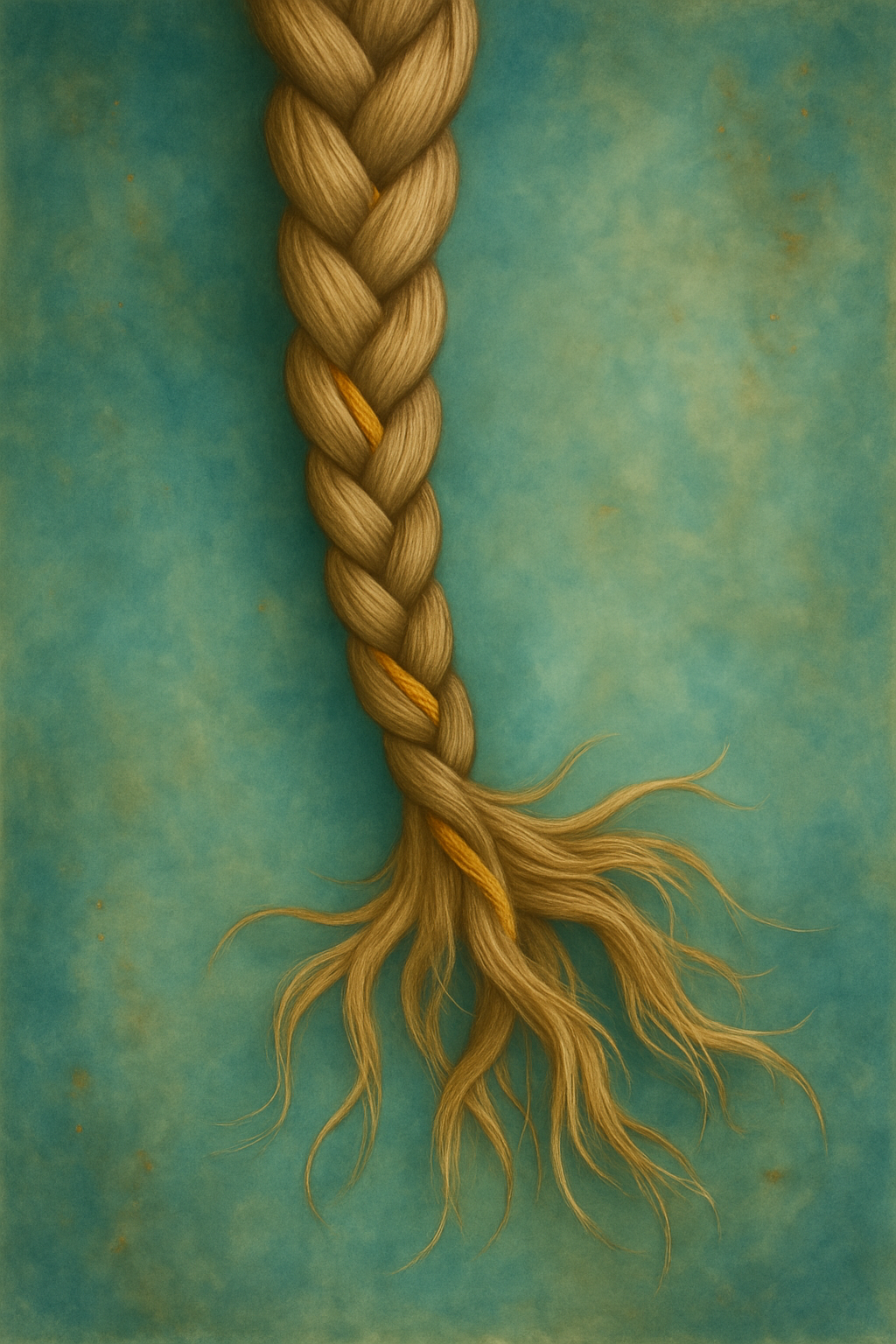Is It Just Me... or Is This AuDHD?: Untangling Your Past Through the Lens of AuDHD
⚠️ Need a heads-up? This post takes about 11 minutes to read silently (or 22 aloud).
The Braid
Think of your life as being a braid. Strand by strand the person you are now was woven over the years.
By moments, reactions, instincts, preferences. Things you were praised for, things you were shamed for. How you learned to get things done. How you held your feelings. How you fidgeted. How you focused (or couldn’t). How you shaped yourself around others to be more palatable, or invisible, or just… enough. The braid (or rope, if you prefer) you’ve carried through life wasn’t necessarily one you chose. It made itself, woven from how you survived, what you learned to hide, and what the world expected of you.
But now you’re allowed to unweave it. To pause. To hold each strand up to the light. And to rebraid, on your own terms. You might be here because you’ve already started to wonder, Am I AuDHD? Or because someone mentioned the term AuDHD and you weren’t sure what it meant, but something made you lean in.
This post isn’t a test, It’s not a checklist, And it’s not an “official” diagnostic.
It’s just a moment to sit with your “strands” and see what you notice. If you’re reading this, maybe something in you is already stirring. Something that suspects the story you’ve been told (or telling) about yourself might not be the whole truth. Maybe you’re wondering:
Is it just me… or is this AuDHD?
What Is AuDHD?
AuDHD is a term used to describe people who are both Autistic and have ADHD. It’s not a separate diagnosis; it’s a term for a neurotype that blends the characteristics of both Autism and Attention-Deficit/Hyperactivity Disorder. Sometimes they overlap, sometimes they compete and often… they tangle each other up.
Because Autism and ADHD pull in opposite directions in ways that are hard to untangle from the inside:
ADHD craves novelty. Autism finds comfort in sameness.
ADHD jumps into action. Autism freezes under uncertainty.
ADHD seeks stimulation. Autism can be overwhelmed by it.
ADHD externalizes. Autism internalizes.
ADHD is impulsive. Autism can be rigid.
ADHD says yes, then forgets. Autism says no, then regrets.
Living at the intersection of both can feel like being made of static and silence all at once. You might feel like you're simultaneously too much AND not enough. Like you're doing everything and still falling behind. Like people don’t really see you, but you’re not even sure you’d recognize the real you either.
For many people (especially women, nonbinary & queer folks), AuDHD traits go unnoticed or misdiagnosed for years. That’s because:
We mask. We study people. We make eye contact because we were told to.
We get labeled with anxiety, depression, or trauma responses, because that’s what shows on the surface.
We internalize the chaos instead of acting it out, because that’s more socially acceptable.
We become good at coping. And sometimes, good at collapsing quietly.
Late-diagnosed (or self-diagnosed) AuDHD folks often describe the experience as a kind of inner tectonic shift, an identity earthquake. Suddenly, your past feels like a puzzle that was always missing crucial pieces. And once you find them, you start re-reading your whole life with a different lens. It can be both painful and profound; Grieving who you had to be, celebrating who you’ve always been underneath. That’s why this post exists, not to sort you into a category, but to offer a mirror that can help you begin the reweaving. To help you sit with five key strands that show up in many AuDHD lives. Each one will be introduced with a short definition, followed by a set of reflective questions, and examples of how an AuDHD person might respond for you to consider. (And since this is a longer post, I have the questions and examples in drop-downs, just tap the arrows to expand them!)
These are the five core strands we’ll explore:
Executive Function & Attention
Sensory Processing
Emotional Regulation
Social Cognition & Interaction
Internal Processing & Identity
These are not official diagnostic criteria, they are patterns: ways of noticing, remembering, and making meaning. Some of them might feel like old friends. Some might surprise you. There are no grades here. No score. No threshold to pass. Just an invitation to sit with your braid/rope and see what might speak to your life experience.
Executive Function & Attention
This strand includes the skills that help you plan, start, complete, and shift between tasks. It’s the part of your brain responsible for goal-setting, motivation, follow-through, and working memory (aka: holding things in your head while doing something else).
For many people with AuDHD, executive function is a rollercoaster. You may be brilliant at complex thinking but still forget to eat. You may be wildly productive… until you hit a wall. You may feel paralyzed before starting, even when you genuinely want to do the thing.
You might think:
Why can I hyperfocus for five hours, but still can’t return a simple email?
Why do I avoid tasks I care about?
Why can’t I start unless it’s urgent or unless someone’s watching?
These aren’t moral failings. They’re neurological patterns. And they’re not always consistent, that’s part of what makes them so confusing.
(Tap the arrows to show the questions and example answers in the drop-downs)
-
As a child, did you ever become so absorbed in a specific activity (e.g., a hobby, special interest, video game, craft) that you lost track of time, forgot to eat, or didn’t hear people speaking to you?
How do you typically react, internally and externally, when you're interrupted while deeply focused?
Do you ever find yourself completely stuck at the beginning of a task, even if you want to do it or know how to do it?
When switching from one task or activity to another, do you feel friction, overwhelm, or resistance, even if the next thing is something you enjoy?
Do you frequently replay conversations in your head (before they happen or after they’re over)? Is it helpful, distracting, or both?
Have you ever felt like time disappears when you’re engaged, or drags unbearably when you’re not?
-
“Sometimes I feel like I’m frozen at the starting line. I can see the task, I care about it, but I can’t make my body begin.”
“If I get interrupted while working, I get irritated or disoriented, like I’ve been yanked out of a dream.”
“I plan everything in my head but can’t seem to start unless I’m panicking or someone is watching me do it.”
“I replay conversations obsessively, especially if I think I sounded weird or missed something important.”
“I’ll hyperfocus for hours without realizing it, and then crash for days.”
Prompts for journaling:
What parts of this feel familiar to you?
What are some ways you’ve learned to cope with or mask executive function challenges?
What would it feel like to stop blaming yourself for struggling with this?
2. Sensory Processing
This strand is all about how your brain takes in the world around you. Sounds, smells, textures, light, pressure, temperature, motion, etc. For many AuDHD people, these sensations come in either “not enough” or “way too much.”
You might:
Be overwhelmed by background noise, but still need a fan running to focus
Crave deep pressure, but hate tight clothes
Get overstimulated in stores, crowds, or fluorescent lighting
Wear noise-canceling headphones not for sound, but for peace
Feel like you're going to short-circuit when multiple senses are activated at once (for you parents out there: crying toddler + blinking light + itchy tag = losing your shit)
And on the flip side, you might actively seek out certain sensations:
Pacing to think
Listening to the same song on loop (while this is not a test… bonus points if you comment what you’ve got on repeat right now!)
Fidgeting to stay present and attentive
Standing to eat, or walking in circles to regulate
Using texture or movement to soothe yourself
This isn’t pickiness or weirdness. This is sensory self-management.
-
Are you sensitive to certain sounds, lights, fabrics, textures, or smells, either now or as a child?
Do you experience strong internal reactions to things other people seem to ignore (e.g., buzzing lights, sniffing, chewing, perfume)?
Do you use tools or tricks to reduce input (e.g., noise-canceling headphones, dim lighting, sunglasses indoors)?
Do you crave specific sensory experiences (e.g., deep pressure, rhythmic movement, certain textures) to stay calm or focused?
Do you struggle to rest or sit still unless you're engaging your senses somehow?
Have you ever avoided a place, task, or social setting because you knew the sensory environment would be “too much”?
-
“I can’t concentrate if there’s even a ticking clock in the room, but I also need some kind of white noise or I spiral.”
“The lighting in big box stores makes me dizzy and snappy.”
“I stand to eat or walk in circles because I can’t sit down and be in my body sometimes.”
“Certain clothes just make me angry, like irrationally so.”
“I wear headphones even when I’m not listening to anything, just to reduce the pressure of sound.”
“I need crunchy snacks or chewing gum to regulate, and I didn't even know that was a thing until recently.”
Prompts for journaling:
What sensory strategies have you developed without even realizing they were strategies?
How do you soothe your nervous system, and what overstimulates it the fastest?
3. Emotional Regulation
This strand is all about how you experience, process, and express emotion, especially under stress or change.
For many AuDHD people, emotions come in fast, big, and often without warning. You may feel like your inner world runs hot while your outside looks composed, or the opposite: a small event triggers a big reaction, and you don’t always understand why. You might spiral into overthinking after a mild disagreement. You might bottle things until they explode or disappear altogether. And for those of us who have menstrual cycles, there’s added dimension as often neurodivergent women struggle with PMDD (Premenstrual dysphoric disorder), think PMS on steroids.
Emotional regulation challenges don’t mean you’re unstable or dramatic, just that your nervous system gets overwhelmed more quickly… and recovers more slowly.
You may also have developed incredible emotional intuition, but still struggle to name your own feelings in real time.
You might intellectualize your emotions instead of embodying them, or you might suppress them until your body insists on being heard.
Cue the meltdown.
-
Do you find yourself having emotional reactions that feel “too big” for the situation, and then feel shame or confusion afterward?
Have you ever shut down completely (mentally or emotionally) when overstimulated, anxious, or criticized?
Do you experience delayed emotions, realizing later how something actually made you feel?
Do your emotions often feel hard to name, even when you know you're having a strong internal reaction?
Do you fear being misunderstood, too intense, or emotionally “too much” for others?
Do small changes or unexpected disruptions (even good ones) create strong internal resistance or overwhelm?
-
“I’m not always good at knowing what I feel, but I can usually tell you what someone else in the room is feeling.”
“Sometimes I explode over something tiny, but it's really about everything I’ve been holding in for days.”
“If plans change suddenly, I might smile and say it’s fine, but inside, it’s like my brain is melting.”
“I don’t react in the moment, but later I replay it over and over, wondering what I missed.”
“I grew up thinking I was emotionally unstable, but I think I was just overloaded.”
Prompts for journaling:
What emotions have you had to hide or manage for the comfort of others?
How do you process feelings now, and what do you wish you had more permission to feel?
4. Social Cognition & Interaction
This strand is all about how you connect with others, interpret social signals, and express yourself in relationships.
For many AuDHD people, social life feels like being dropped into a play where everyone else got a script and you didn’t. You might be deeply intuitive in some situations, and completely misattuned in others. You might come across as blunt, intense, passive, too quiet, too talkative, too much, too confusing, too weird, too childish… even when you’re just being yourself.
You may:
Rehearse conversations before they happen
Replay them endlessly afterward
Worry that people misread your tone, expression, or intentions
Mirror others unconsciously, or mask to stay “safe”
Over-explain everything
Be showing more on your face than you realize, or even come off completely flat, or even cold.
Apologize for things you’re not sure you actually did wrong, and still walk away thinking… “Wait. Did I get that right?”
You might feel lonely even around people who care about you. Or find that friendships come easily when there’s a shared interest, but stall out when it gets more personal. None of this means you’re bad at relationships. It means you’ve been trying to connect using a map that wasn’t made for you.
-
Do you feel like you’re often “performing” a version of yourself in social situations?
Do you frequently overthink how you came across after conversations, even casual ones?
Do you feel confused by unspoken rules, body language, or tone shifts, especially in group settings?
Have you been told you’re intense, blunt, awkward, “hard to read,” or “too much”?
Do you prefer connecting through shared interests or structured roles (e.g., projects, work, hobbies) rather than emotional intimacy?
Do you need time alone to recover after social interaction, even with people you love?
-
“I play out conversations in my head before they happen, and still leave wondering if I said something wrong.”
“I can be emotionally intuitive in some moments, and completely miss sarcasm or indirectness in others.”
“Small talk exhausts me, but I can talk for hours about something I care about.”
“I mask so much that I sometimes forget what I actually think or feel in a conversation.”
“I love people, but I don’t always know how to do people.”
Prompts for journaling:
What kinds of social connection feel good and safe to you?
What aspects of “being social” feel the most draining or confusing?
5. Internal Processing & Identity
This strand lives under the surface, it’s how you know yourself, how you make meaning, how you reflect and self-narrate.
For many AuDHD people, the inside world is rich, layered, and constantly churning like an ocean… even if the outside looks calm. You might think in vivid images or tangled loops. You might analyze everything: your feelings, your relationships, your purpose, the shape of your thoughts. You might feel like a thousand versions of yourself live inside, and you’re always managing the meeting.
You may have grown up feeling like:
You were fundamentally different
You were missing a rulebook everyone else got
You were “too intense,” “too weird,” “too smart,” “too emotional,” or “too much”
You could understand complex ideas easily, but not understand yourself
You had to watch yourself from the outside to figure out how to behave
You may have always been fascinated by how others perceive you
You may have always felt like an anachronism, a person outside of their proper time. too mature as a child, too childish as an adult.
Over time, you might have become a master of patterns, finder of themes, a person who builds systems, metaphors, or frameworks to make sense of internal chaos. And sometimes… you still don’t feel known, even to yourself. This is identity fragmentation in response to a world that never mirrored you clearly.
-
Do you often feel fundamentally different from others, like everyone else got a “how to be a person” manual that you didn’t receive?
Do you spend a lot of time in your head, analyzing, categorizing, making sense of patterns or memories?
Do you experience a strong sense of justice or ethics that can override social norms or expectations?
Do you struggle to fully feel or express your identity, especially when it feels like it changes based on context?
Do you often think in metaphors, visuals, or symbolic frameworks to explain abstract feelings?
Have you ever wondered if the version of you others see is completely different from who you feel like inside?
-
“I feel like I’m running an internal translator all the time just to interact with the outside world.”
“I can explain complicated things to others, but don’t always know how to explain myself.”
“I think in webs. Everything connects. Everything loops back to something else.”
“I have a strong sense of values and boundaries in my head, but they’re hard to uphold in real time.”
“I constantly question if I’m showing up authentically, or just being who I think people need me to be.”
Prompt for journaling:
What are the ways you’ve learned to make sense of your inner world?
What parts of yourself have felt too complex to name, but never really left you?
What Comes Next?
If you’ve made it this far and it was … a lot, pause. and take a breath. You just held up each strand of your life and asked, “Is this mine? Is this me?” That takes courage, and if you’re feeling cracked open right now, emotionally, energetically, and existentially, you’re not alone. That’s part of the process. This post isn’t meant to give you answers (or hurt your feelings), but rather to give you a mirror, and maybe a map.
You might not feel ready to say, “I’m AuDHD,” or you might already know in your bones.
Or you might be somewhere in between, still untangling.
Wherever you are: I encourage you to take your time to reflect, pause, and return later. You’re allowed to grieve the braid that was woven for you, and imagine a new one you get to reweave; in fact, I think it’s necessary.
So… what now?
There’s no one “right” path, but here are some next steps you might consider:
Sit with the strand that resonated most. Journal on it using the prompts included in each section (or just do it stream-of-consciousness). Let it breathe. Let it bounce around in that big beautiful brain of yours.
Talk about it with a trusted person or therapist, someone who knows how to hold complexity.
Know that self-diagnosis is valid. You don’t need a gatekeeper to tell you your experience is real. The fact of the matter is you do not necessarily need an official diagnosis to work through this.
And if you do want a formal assessment, that’s valid too. Some people find that clarity grounding. Some of my clients have pursued it after exploring the AuDHD lens in therapy, and it gave them the language they needed.
If you identify with this post, let me tell you personally: You’re not too much, you’re not imagining things;
You’re just wired differently, and now, maybe you’re finally seeing the shape of it.
You don’t have to throw your rope away. You get to unweave it, hold the strands, and rebraid it, on your terms.
This journey is close to my heart, and I have spent a lot of time reflecting and learning so much about myself, and how to move through the world now with all of this in my own mind and heart. I wrote the following poem as a reflection exercise, and I want to share it with you.
“The Braid”
This braid you’ve carried wasn’t only yours.
It was formed in silence, through praise, through pressure, through the hidden things
To feel safe.
To be loved.
To belong.
And now you’re holding each of these strands.
Not to tear them apart, but to know them.
To name them. To forgive them.
To reweave them, gently, truthfully,
On your terms now.
More empathy, more understanding in your hands as you reweave,
Strand by strand.
This Braid is yours now.
Let’s Keep Going, Together
If this post resonated with you, you’re not alone. I’ve been there too, sitting with the strands, holding big feelings, and trying to make sense of it all.
I’m currently exploring the idea of starting a support group for neurodivergent adults (especially those who identify as AuDHD, late-diagnosed, or self-discovered). It would be a low-pressure, affirming space to share, reflect, and just exist as our full selves, no masking required!
If that sounds like something you’d want to be part of, I’d love to hear from you.
Send me an email at info@bethanyvash.com or drop a comment below to let me know you’re interested!






